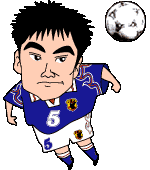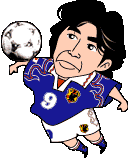Ooft Japan
Japan's National Team 1992-93
|
Marius Johan Ooft, a Dutchman with a relatively good record of coaching professional teams in his home country, was brought in to take the reins of the Japanese national team in 1992. He inherited a team in disarray, as discipline had not been one of Kenzo Yokoyama's strong points. A story widely reported in later years, and seemingly supported by comments in Ooft's book, is that in an early practice session he tried to get Kazuyoshi ("Kazu") Miura to move from forward to central midfielder. Ooft was probably making a wise move, as Kazu certainly has the skills to make a good central midfielder. However, Kazu was more interested in scoring goals himself than in sacrificing for the team's benefit. His response was direct: "if you move me to midfield, you will lose your job. If I decide I don't like where I'm playing I will threaten to quit, and I have more influence with the JFA than you do". Whether this incident actually occurred, or not is hard to say. The key point is that it accurately reflects the conditions Ooft had to deal with. Despite the fact that their level of play was still very poor on an international level, Japan's players were heroes in their own country, and many had tremendous egos. Ooft not only had to work hard to try to develop the team's football abilities; he also had the thankless task of trying to sort out the many "personality conflicts" in the team.
Though his work was cut out for him from the start, Ooft had some advantages as well. First of all, the quality of players in Japan was improving rapidly. Whatever one might say about Kazu's attitude, he was a very talented scorer, especially in his younger years. Kazu was the first Japanese player to play overseas for a big-name club, signing with Genova (to much fanfare) in the mid-90s. Though his performance in Serie A was less than impressive, he earned the team a level of international recognition and charisma, for the first time ever. |
|
||||||||||||||||||||||||||||||||||||||||||||||||||||||||||||||||||||||||||||||||||||||||||||||||||||||||||||||||||||||||||||||||||||
The defence continued to be supported by the solid center backs, Masami Iihara and Tetsuji Hashiratani. The two had played together for several years with the Nissan Motors football club --which became Yokohama Marinos when the J.League was formed in 1992, -- and had excellent communication with one another. Iihara, who is Japan's most-capped player by a fairly wide margin, earned the nickname "Mr. Marino". With support from other NT newcomers like Norio Omura and Kazu's elder brother, Yasutoshi Miura, the defence became a solid foundation for the team.
More importantly, the offence was finally starting to gel, around players like Hajime Moriyasu, Masahiro Fukuda, and Tatsuya Takagi, and midfielders Tsuyoshi Kitazawa, Masaaki Sawanobori, and the Brazilian-born naturalised Japanese player Ruy Ramos. Although Ramos missed the chance to play for Japan when he was in his prime, because he still had not naturalised, his ball-handling skills persisted well into his late 30s, and he didnt retire from the J.League until the ripe age of 42. Meanwhile, the birth of the J.League was providing both fan support and an inflow of money for team development. Over his two-year tenure, Ooft developed Japan into one of the top teams in Asia, and the 1994 World Cup qualiying campaign clearly marks Japan's emergence as a team to take seriously.






Unfortunately, for both Ooft and Japan, the qualifying campaign would end in tragedy at Doha, Iraq on October 28, 1993. Japan had a very successful qualifying run, beating its key East Asia rival South Korea, and completing the campaign with just one loss, to Iran. As they travelled to the final qualifier against Iraq, everyone knew that a victory would clinch them a ticket to the US. Japan played a fine match, and as the clock ran down to 90 minutes, the team was leading 2-1. . . . but like the inexperienced team they still were, Japan let down their guard as the clock ticked away. In the final seconds of injury time, a cross came in and an Iraqi player leapt high to head the ball home, knotting the score at 2-2, snatching victory from their grasp and giving South Korea the place in WC 1994. The Japanese players collapsed on the field in tears of shock and dismay, the pictures of their anguish being broadcast over and over to the throngs of devastated fans. This "Agony at Doha" was ingrained in the memories of every Japanese football fan. Even today, fans will often hold up signs in the waning moments of key matches that say "REMEMBER 10.28.93".
This match was a tragedy for Ooft, as much as for the Japanese national team. It was simply impossible for the coach to survive such a disaster. Everyone wanted some scapegoat on which to vent their anger, and just ten days after returning to Japan, Hans Marius Ooft was fired.
|
||||||||||||||||||||||||||||||||||||||||||||||||||||||||||||||||||||||||||||||||||||||||||||||||||||||||||||||||||||||||||||||||||||||||||||||||||||||||||||||||||||||||||||||||||||||||||
"-" Denotes players that were not named to the team in this year.
"0" Indicates that the player was named to the team in this year,but did not appear in any international A matches.



